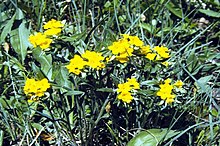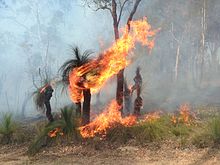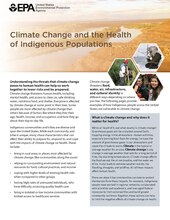
Traditional ecological knowledge (TEK) is a cumulative body of knowledge, practice, and belief, evolving by adaptive processes and handed down through generations by cultural transmission, about the relationship of living beings (including humans) with one another and with their environment.
The application of TEK in the field of ecological management and science is still controversial, as methods of acquiring and collecting knowledge—although often including forms of empirical research and experimentation— may differ from those most often used to create and validate scientific ecological knowledge. Non-tribal government agencies, such as the U.S. EPA, have established integration programs with some tribal governments in order to incorporate TEK in environmental plans and climate change tracking. In contrast to the universality towards which contemporary academic pursuits often aim, TEK is not necessarily a universal concept among various societies, instead referring to a system of knowledge traditions or practices that are heavily dependent on "place".
There is a debate whether Indigenous populations retain intellectual property rights over traditional knowledge and whether use of this knowledge requires prior permission and license. This is especially complicated because TEK is most frequently preserved as oral tradition and as such may lack objectively confirmed documentation. As such, the same methods that could resolve the issue of documentation to meet legal requirements may compromise the very nature of traditional knowledge.
Traditional knowledge is used by its holders to maintain ecological resources necessary for survival. While TEK and the communities which contain it are threatened in the context of rapid climate change or environmental degradation, TEK also can help to explain the impacts of those changes within the ecosystem.
Knowledge, practice, and belief
History
"The earliest systematic studies of TEK were done by anthropologists. Ecological knowledge was studied through the lens of ethnoecology (an approach that focuses on the conceptions of ecological relationships held by a people or a culture)..." in understanding how systems of knowledge were developed by a given culture. Harold Colyer Conklin, an American anthropologist took the lead in documenting indigenous ways of understanding the natural world. Conklin and others documented how traditional peoples, such as Philippine horticulturists, had detailed knowledge about the plants and animals where they resided. Direct involvement in gathering, fashioning products from, and using local plants and animals created a scheme in which the biological world and the cultural world were tightly intertwined. The field of TEK encompasses a broad range of questions related to cultural ecology and ecological anthropology by emphasizing the study of human-nature relations, adaptive processes, which argues that social organization itself is an ecological adaptational response by a group to its local environment, and the practical techniques on which these relationships and culture depend.
in 1987 report, Our Common Future, by the World Commission on Environment and Development was published by the United Nations. The report points out that the successes of the 20th century (decreases in infant mortality, increases in life expectancy, increases in literacy, and global food production) have given rise to trends that have caused environmental degradation "in an ever more polluted world among ever decreasing resources." The report declared that tribal and indigenous peoples had lifestyles that could provide modern societies with lessons for management of resources in complex forest, mountain, and dryland ecosystems.
Fulvio Mazzocchi of the Italian National Research Council's Institute of Atmospheric Pollution outlines the characteristics of TEK as follows:
Traditional knowledge has developed a concept of the environment that emphasizes the symbiotic character of humans and nature. It offers an approach to local development that is based on co‐evolution with the environment, and on respecting the carrying capacity of ecosystems. This knowledge--based on long‐term empirical observations adapted to local conditions--ensures a sound use and control of the environment, and enables indigenous people to adapt to environmental changes. Moreover, it supplies much of the world's population with the principal means to fulfil their basic needs, and forms the basis for decisions and strategies in many practical aspects, including interpretation of meteorological phenomena, medical treatment, water management, production of clothing, navigation, agriculture and husbandry, hunting and fishing, and biological classification systems.... Beyond its obvious benefit for the people who rely on this knowledge, it might provide humanity as a whole with new biological and ecological insights; it has potential value for the management of natural resources and might be useful in conservation education as well as in development planning and environmental assessment.
Some anthropologists, such as M. Petriello and A. Stronza, warn that presenting TEK as an "indigenous" construct will cause the privileging of certain types of TEK over others and restricting which groups are thought to possess TEK results in reduced understanding of and collaboration with groups such as campesinos who while not often classified as "indigenous" nevertheless possess TEK. The term TEK has been criticised as a form of intellectual appropriation that modifies traditional/indigenous knowledges to better fit a conventional Western modern science framework.
Aspects of traditional ecological knowledge
Nicholas Houde, in an article published in Ecology and Society, identifies six facets of traditional ecological knowledge: factual observations, management systems, past and current uses, ethics and values, culture and identity, and cosmology. These aspects emphasize how "cooperative management better identify areas of difference and convergence when attempting to bring two ways of thinking and knowing together."
Factual observations
The first aspect of traditional ecological knowledge incorporates the factual, specific observations generated by recognition, naming, and classification of discrete components of the environment. This type of "empirical knowledge consists of a set of generalized observations conducted over a long period of time and reinforced by accounts of other TEK holders."
Management systems
The second facet refers to the ethical and sustainable use of resources in regards to management systems. More specifically, issues such as dealing with pest management, resource conversion, multiple cropping patterns, and methods for estimating the state of resources can be thought of as part of such management systems. How resource management can adapt to local environments is another crucial aspect of such considerations.
Past and current uses
The third facet refers to the time dimension of TEK, focusing on past and current uses of the environment transmitted through oral history, such as land use, settlement, occupancy, and harvest levels. Oral history is used to transmit cultural heritage generation to generation about such topics as medicinal plants and the existence of historical sites, and contributes to a sense of family and community.
Ethics and values
The fourth facet refers to value statements and connections between the belief system and the organization of facts. In regards to TEK it refers to environmental ethics that keeps exploitative abilities in check. This facet also refers to the expression of values concerning the relationship with the habitats of species and their surrounding environment - the human-relationship environment.
Culture and identity

The fifth facet refers to the role of language and images of the past giving life to culture. This facet reflects the stories, values, and social relations that reside in places as contributing to the survival, reproduction, and evolution of aboriginal cultures, and identities while stressing "the restorative benefits of cultural landscapes as places for renewal."
Cosmology
The sixth facet is a culturally based cosmology that is the foundation of the other aspects. This can vary greatly from one culture to the next. The term 'cosmology' relates to the assumptions and beliefs cultures have about how things work, explains the way in which things are connected, and gives principles that regulate human–animal relations and the role of humans in the world.
Ecosystem management
Main article: Ecosystem management
Ecosystem management is a multifaceted approach to natural resource management that can incorporate science and TEK to collate long-term measurements that would otherwise be unavailable. This can be achieved by scientists and researchers collaborating with Indigenous peoples through a consensus decision-making process while meeting the socioeconomic, political and cultural needs of current and future generations. Concerns over instances where indigenous knowledge has been used without consent (cultural appropriation), acknowledgment, or compensation have been raised by some critics.
Ecological restoration
Ecological restoration is the practice of restoring a degraded ecosystem through human intervention. There are many links between ecological restoration and ecosystem management practices involving TEK. Due to the aforementioned unequal power between indigenous and non-indigenous peoples, equitable partnerships formed in theses contexts can help mitigate extant social injustices, as in the case when Indigenous Peoples lead ecological restoration projects.
Effects of environmental degradation
In some areas, environmental degradation has led to a decline in traditional ecological knowledge. For example, at the Aamjiwnaang community of Anishnaabe First Nations people in Sarnia, Ontario, Canada, residents suffer from a "noticeable decrease in male birth ratio ..., which residents attribute to their proximity to petrochemical plants".
Climate change

Climate change is affecting indigenous people in different ways depending on the geographic region which require different adaption and mitigation actions. For example, to immediately deal with these conditions, the indigenous people adjust when they harvest and what they harvest and also adjust their resource use. Climate change can change the accuracy of the information of TEK. The indigenous people have relied on indicators in nature to plan activities and even for short- term weather predictions. As a result of ever more increasingly unusual conditions, entire indigenous cultures have been disrupted and displaced. As a result, there is a loss of the cultural ties to the lands they once resided on and there is also a loss of the traditional ecological knowledge they had with the land there. Climate change adaptations have the potential to harm indigenous rights. The US EPA promised to take traditional ecological knowledge into consideration in planning adaptations to climate change.
The rising temperature poses a threat for ecosystems including the locations where plants grow, the times that insects emerge throughout the year, and changes to the seasonal habitats of animals. For many harvesting seasons, indigenous people have shifted their activity months earlier due to impacts from climate change, adaptations that becomes more important in the face of a rapidly changing climate. Climate change can therefore affect the availability and quality of environmental resources for indigenous people. For example, as sea ice levels decrease, Alaska Native peoples have experienced changes in their daily lives. Thawing permafrost has damaged buildings and roadways while clean water resources dwindle. Fishing, transportation, social and economic aspects of their lives are destabilized. Additionally, as the temperature gets hotter, disasters such as uncontrolled wild fires become more likely. One Indigenous nation in Australia was recently given back land and they reinstated their traditional practice of controlled burning. This was documented to increase the area's biodiversity and decrease the severity of the wildfires. Traditional ecological knowledge can help provide information about climate change across generations and geography of the actual residents in the area. The National Resource Conservation Service of the United States Department of Agriculture has used methods of the indigenous people to combat climate change conditions.
Examples
Instances where TEK was recognized in the literature are included below.
Karuk and Yurok Burning
Environmental sociologist Kirsten Vinyeta and tribal climate change researcher Kathy Lynn reported on the Karuk Tribe of California: "Traditional burning practices have been critical to the Karuk since time immemorial. For the Tribe, fire serves as a critical land management tool as well as a spiritual practice." Environmental studies professor Tony Marks-Block, ecological researcher Frank K. Lake, and tropical forester Lisa M. Curran explained how the Karuk and the Yurok Tribes organized controlled burns and fuel reduction treatments in their ancestral territories to reduce wildfire risk and "restore ecocultural resources depleted from decades of fire exclusion". Professor of sociology Kari Norgaard and Karuk tribe member William Tripp recommend "this process... be replicated and expanded to other communities throughout the western Klamath Mountains and beyond" to promote the positive outcomes seen as a result of the custodial burns of these tribes.
Anishinabe Ecological Conservation
Indigenous philosopher and climate/environmental justice scholar Kyle Powys Whyte writes "Anishinaabek/Neshnabék throughout the Great Lakes region are at the forefront of native species conservation and ecological restoration projects that seek to learn from, adapt, and put into practice local human and nonhuman relationships and stories at the convergence of deep Anishinaabe history and the disruptiveness of industrial settler campaigns."
Lummi Nation of Washington State Conservation of Southern Resident Killer Whales
Ecological scholars Paul Guernsey, Kyle Keeler and Lummi member Jeremiah Julius describe in a paper how "In 2018, the Lummi Nation dedicated itself to a Totem Pole Journey across the United States calling for the return of their relative "Lolita" (a Southern Resident Killer Whale) to her home waters.... asking for NOAA to collaborate in feeding the whales until the chinook runs of the Puget Sound can sustain them."
Agroforestry in northeast India
In India, indigenous knowledge relating to agroforestry has been passed down for generations. One paper suggests mitigating the negative impacts of colonial-era and more recent corporate land management practices could be achieved through a revival of traditional farming methods.
One traditional farming practice is jhum, also known as shifting cultivation or "slash and burn". This is a common practice in northeastern India, where sections of land are regularly burned and returned to after the soil's fertility is restored. The practice of jhum heightens carbon storage and biodiversity. Jhum paired with certain plant-based pesticides was demonstrated to create an agroforestry structure that could function without dependence on industrial fertilizers and pesticides.
See also
- Agroecology
- Braiding Sweetgrass
- Clam garden
- Non-timber forest product
- Traditional knowledge
- African insect TEK
- Indigenous science
Notes
- There is no single definition for traditional ecological knowledge and some prefer other terms for the same or similar concepts. The definition given here is from the fourth edition of Fikret Berkes' Sacred Ecology which has evolved through work and consultation dating back to 1993.
- Berkes 2017, p. 8. sfn error: no target: CITEREFBerkes2017 (help)
- Simeone 2004.
- Berkes 1993, p. 1.
- Berkes 1993, p. 1-2.
- Brundtland 1987.
- Mazzocchi 2006.
- Petriello & Stronza 2021.
- Kim, Eun-Ji Amy; Asghar, Anila; Jordan, Steven (2 October 2017). "A Critical Review of Traditional Ecological Knowledge (TEK) in Science Education". Canadian Journal of Science, Mathematics and Technology Education. 17 (4): 258–270. Bibcode:2017CJSMT..17..258K. doi:10.1080/14926156.2017.1380866. ISSN 1492-6156.
- ^ Houde 2007.
- ^ Usher 2000.
- Douterlungne 2008.
- Hall et al. 2021.
- Hoover 2012.
- Vinyeta & Lynn 2013, p. 6.
- ^ Bennett et al. 2014.
- ^ Moffa 2016.
- ^ Ignatowski & Rosales 2013.
- EPA Pamphlet 2016.
- Jupp 2020.
- Vinyeta & Lynn 2015, p. 42.
- Marks-Block, Lake & Curran 2019, p. 1.
- Norgaard & Tripp 2019, p. 100.
- Whyte 2017, p. 209-210.
- Guernsey, Keeler & Julius 2021, p. 266-7.
- Menon 2022.
- Eliazer Nelson, Ravichandran & Antony 2019.
- Wight 2022.
- Borah, Evans & Edwards 2018.
- Nath, Puzari & Changmai 2024.
References
- Bennett, T. M. B.; Maynard, N. G.; Cochran, P.; Gough, R.; Lynn, K.; Maldonado, J.; Voggesser, G.; Wotkyns, S; Cozzetto, K. (2014). "Indigenous Peoples, Lands, and Resources". In Melillo, J. M.; Richmond, Terese (T.C.); Yohe, G. W. (eds.). Climate Change Impacts in the United States: The Third National Climate Assessment. U.S. Global Change Research Program. pp. 297–317. doi:10.7930/J09G5JR1.
- Berkes, Fikret (1993). "Traditional Ecological Knowledge in Perspective". In Inglis, J.T. (ed.). Traditional Ecological Knowledge: Concepts and Cases. International Development Research Centre. p. 1. OCLC 171562776.
- Berkes, Fikret (2018) . Sacred Ecology (Fourth ed.). Routledge.
- Borah, Joli R.; Evans, Karl L.; Edwards, David P. (September 2018). "Quantifying carbon stocks in shifting cultivation landscapes under divergent management scenarios relevant to REDD +". Ecological Applications. 28 (6): 1581–1593. Bibcode:2018EcoAp..28.1581B. doi:10.1002/eap.1764. ISSN 1051-0761. PMC 6175365. PMID 30044898.
- Douterlungne, David; Levy-Tacher, Samuel I.; Golicher, Duncan J.; Dañobeytia, Francisco Román (29 October 2008). "Applying Indigenous Knowledge to the Restoration of Degraded Tropical Rain Forest Clearings Dominated by Bracken Fern". Restoration Ecology. 18 (3): 322–329. Bibcode:2010ResEc..18..322D. doi:10.1111/j.1526-100X.2008.00459.x. S2CID 85960569.
- Eliazer Nelson, Ann Raeboline Lincy; Ravichandran, Kavitha; Antony, Usha (1 October 2019). "The impact of the Green Revolution on indigenous crops of India". Journal of Ethnic Foods. 6 (1): 8. doi:10.1186/s42779-019-0011-9. ISSN 2352-619X.
- Guernsey, Paul J.; Keeler, Kyle; Julius, Jeremiah 'Jay' (2021). "How the Lummi Nation Revealed the Limits of Species and Habitats as Conservation Values in the Endangered Species Act: Healing as Indigenous Conservation". Ethics, Policy & Environment. 24 (3): 266–282. doi:10.1080/21550085.2021.1955605.
- Hall, Monique Mae; Wehi, Priscilla M.; Whaanga, Hēmi; Walker, Erana T.; Koia, Jonni Hazeline; Wallace, Kiri Joy (January 2021). "Promoting social and environmental justice to support Indigenous partnerships in urban ecosystem restoration". Restoration Ecology. 29 (1). Bibcode:2021ResEc..2913305H. doi:10.1111/rec.13305. hdl:10289/15955. S2CID 228960211.
- Hoover, Elizabeth (2012). "Indigenous Peoples of North America: Environmental Exposures and Reproductive Justice". Environmental Health Perspectives. 120 (12): 1645–1649. Bibcode:2012EnvHP.120.1645H. doi:10.1289/ehp.1205422. JSTOR 23323091. PMC 3548285. PMID 22899635.
- Houde, Nicolas (2007). "The Six Faces of Traditional Ecological Knowledge: Challenges and Opportunities for Canadian Co-Management Arrangements". Ecology and Society. 12 (2). doi:10.5751/ES-02270-120234. hdl:10535/2639.
- Ignatowski, Jonathan Andrew; Rosales, Jon (2013). "Identifying the exposure of two subsistence villages in Alaska to climate change using traditional ecological knowledge". Climatic Change. 121 (2). Springer Nature: 285–299. Bibcode:2013ClCh..121..285I. doi:10.1007/s10584-013-0883-4. S2CID 154338699.
- Kimmerer, Robin Wall (2002). "Weaving Traditional Ecological Knowledge into Biological Education: A Call to Action". BioScience. 52 (5). Oxford University Press: 432-438. doi:10.1641/0006-3568(2002)052[0432:WTEKIB]2.0.CO;2.
- Jupp, Tony (2020) (18 February 2020). "Indigenous fire revolution". The Nature Conservancy Australia. Retrieved 12 June 2024.
{{cite web}}: CS1 maint: numeric names: authors list (link) - Marks-Block, Tony; Lake, Frank K.; Curran, Lisa M. (2019). "Effects of understory fire management treatments on California Hazelnut, an ecocultural resource of the Karuk and Yurok Indians in the Pacific Northwest". Forest Ecology and Management. 450. Bibcode:2019ForEM.45017517M. doi:10.1016/j.foreco.2019.117517. S2CID 201207806.</ref>
- Mazzocchi, Fulvio (May 2006). "Western science and traditional knowledge: Despite their variations, different forms of knowledge can learn from each other". EMBO Reports. 7 (5): 463–466. doi:10.1038/sj.embor.7400693. PMC 1479546. PMID 16670675.
- Menon, Minakshi (2022). "Indigenous knowledges and colonial sciences in South Asia". South Asian History and Culture. 13 (1): 1–18. doi:10.1080/19472498.2021.2001198.
- Moffa, Anthony (2016). "Traditional Ecological Rulemaking" (PDF). Stanford Environmental Law Journal. 35 (2).
- Nath, Uttam; Puzari, Amrit; Changmai, Shamikhu (1 January 2024). "Use of traditional plant-based pesticides in the Jhum agroforestry system of Angami tribe in Kohima district of Nagaland, India". Agroforestry Systems. 98 (1): 129–149. Bibcode:2024AgrSy..98..129N. doi:10.1007/s10457-023-00895-3. ISSN 1572-9680.
- Norgaard, Kari; Tripp, William (2019). Karuk Climate Adaptation Plan (PDF) (Technical report). Karuk Tribe.
- Petriello, Michael A.; Stronza, Amanda L. (June 2021). "Hunting as a Source of Local and Traditional Ecological Knowledge among Campesinos in Nicaragua". Human Ecology. 49 (3). Springer Nature: 309–325. Bibcode:2021HumEc..49..309P. doi:10.1007/s10745-021-00238-9. S2CID 236283410.
- Simeone, Tonina (17 March 2004). Indigenous traditional knowledge and intellectual property rights (PDF) (Technical report). Library of Parliament. PRB 03-38E.
- Usher, Peter J. (2000). "Traditional Ecological Knowledge in environmental assessment and management". Arctic. 53 (3). Arctic Institute of North America: 183–193. doi:10.14430/arctic849. hdl:10535/3360. JSTOR 40512207.
- Vinyeta, Kirsten; Lynn, Kathy (March 2013). Exploring the role of traditional ecological knowledge in climate change initiative (PDF) (Technical report). United States Department of Agriculture Forest Service Pacific Northwest Research Station. PNW-GTR-879.
- Vinyeta, Kirsten; Lynn, Kathy (May 2015). Strengthening the federal-tribal Relationship: A Report on Monitoring Consultation under the Northwest Forest Plan (PDF) (Technical report). United States Department of Agriculture Forest Service Pacific Northwest Region. FS/R6/PNW/2015/0005.
- Whyte, Kyle Powys (2017). "Our Ancestors' Dystopia Now: indigenous conservation and the Anthropocene" (PDF). In Heise, Ursula K; Christensen, Jon; Niemann, Michelle (eds.). The Routledge Companion to the Environmental Humanities. Routledge. pp. 206–215.
- Wight, Andrew (4 April 2022). "Traditional Indigenous Agriculture May Be Key To Sustainability In India". Forbes.
- Report of the World Commission on Environment and Development: Our Common Future (PDF) (Technical report). United Nations Oxford University Press. 20 March 1987.
- "Climate Change and the Health of Indigenous Populations" (PDF). EPA United States Environmental Protection Agency. May 2016. Retrieved 5 April 2017.
Further reading
- Fienup-Riordan, Ann (2000). Hunting tradition in a changing world: Yup'ik lives in Alaska today. New Brunswick, NJ: Rutgers Univ. Press. ISBN 0813528054.
- Hernández-Morcillo, Mónica; et al. (2014). "Traditional ecological knowledge in Europe: Status quo and insights for the environmental policy agenda". Environment. 56 (1): 3–17. Bibcode:2014ESPSD..56a...3H. doi:10.1080/00139157.2014.861673. S2CID 153834585.
- Kawagley, A. Oscar (2006). A Yupiaq worldview: a pathway to ecology and spirit (2nd ed.). Long Grove, IL: Waveland Press. ISBN 1-57766-384-5. OCLC 64668378.
- Robin Wall Kimmerer (2013). Braiding Sweetgrass: Indigenous Wisdom, Scientific Knowledge, and the Teachings of Plants (Milkweed Edition) ISBN 9781571313355.
- McGregor, Deborah (2004). "Coming Full Circle: Indigenous Knowledge, Environment, and Our Future". American Indian Quarterly. 28 (3/4): 385–410. doi:10.1353/aiq.2004.0101. JSTOR 4138924.
External links
- Traditional Ecological Knowledge: Interdisciplinary Stewardship of Mother Earth, National Park Service
- Center for Native Peoples and the Environment, at State University of New York, College of Environmental Science and Forestry
- Indigenous Peoples' Restoration Network (IPRN)
- Gwaii Haanas National Park Reserve and Haida Heritage Site
- Table of the Six Faces of TEK
| Environmental humanities | ||
|---|---|---|
| Art |  | |
| Culture | ||
| Literature | ||
| Philosophy | ||
| Religion | ||
| Other | ||
| Related | ||
| Applied | ||
| Science and technology studies | |
|---|---|
| Economics | |
| History | |
| Philosophy | |
| Sociology | |
| Science studies |
|
| Technology studies |
|
| Policy | |